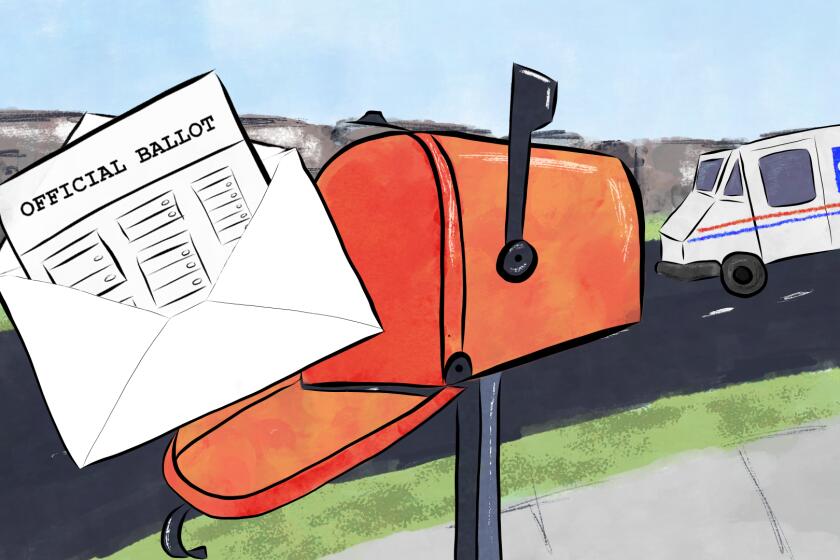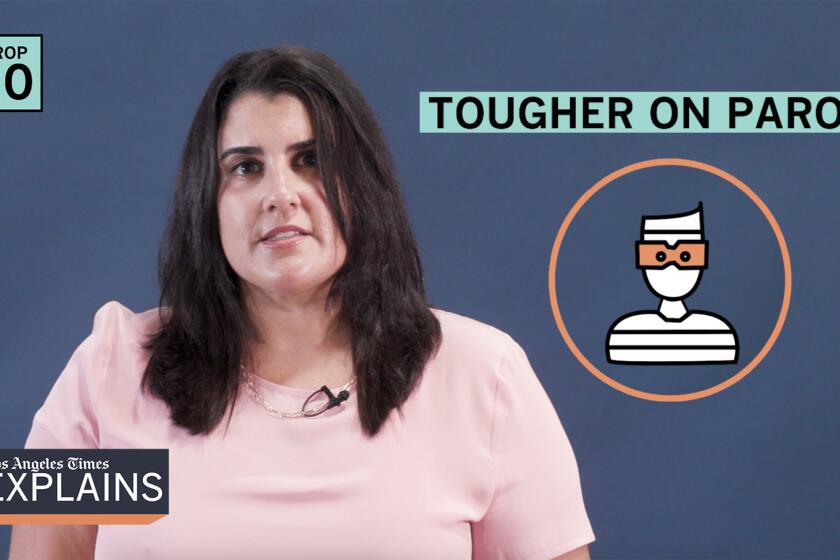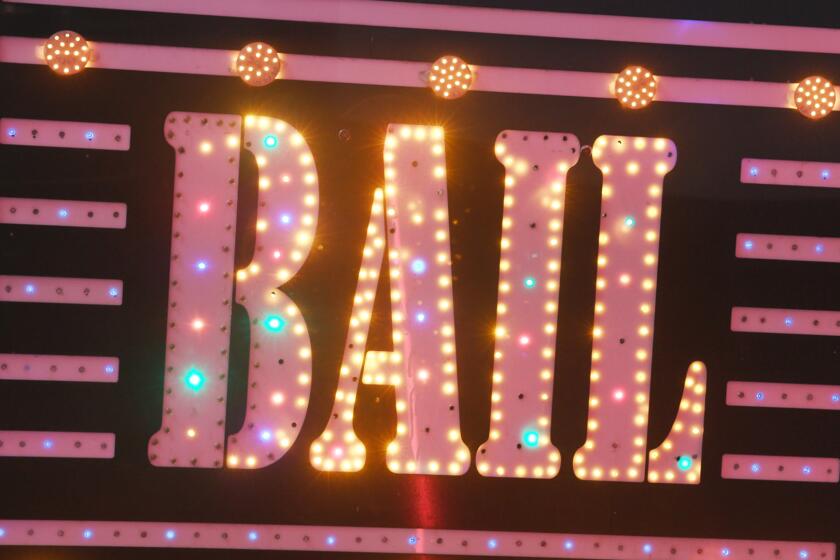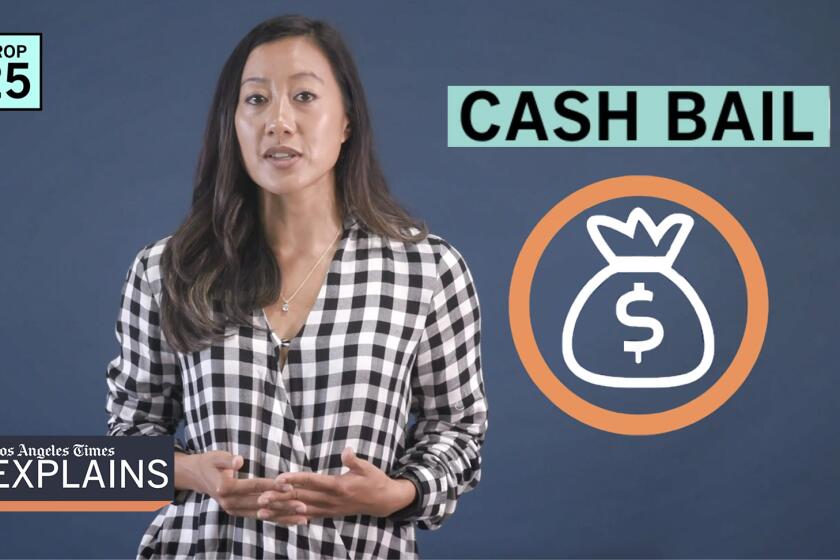Column: These 3 propositions could have a big impact on California’s criminal justice system
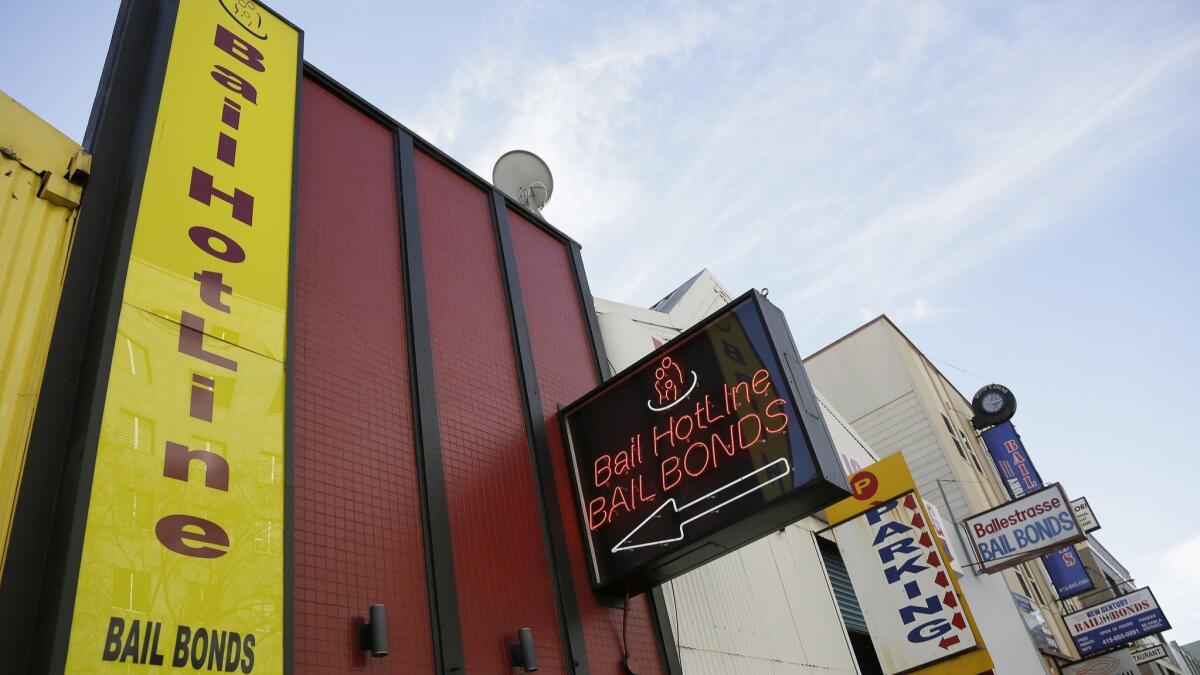
- Share via
SACRAMENTO — This should be a no-brainer: The rape of an unconscious woman is a violent crime.
But under current California law, such an assault is categorized as nonviolent.
So is trafficking a child for sex. Or firing a gun into a house if no one is hit.
It matters because under previous ballot propositions approved by voters, state prison inmates who have been convicted of felonies categorized as violent are not eligible for early release and parole.
Proposition 20 on the Nov. 3 ballot would tweak Propositions 47 and 57, passed in 2014 and 2016, respectively, and correct what 20’s law enforcement and prosecutor backers consider flaws. Supporters claim that too many potentially violent criminals are being set free.
Opponents, including Gov. Gavin Newsom and his predecessor, Jerry Brown, contend that Proposition 20 represents a step backward in forward-looking criminal justice reform.
“Prop. 20 wants to basically eliminate all hope in the prison,” says Brown, the architect and chief backer of Proposition 57, which reduced sentences for many crimes. The former governor has donated $1 million of his $15-million leftover political stash to the No on 20 campaign.
“Men who have given decades will have no chance to earn their way back to society,” Brown asserts. “And that’s fundamental to any kind of criminal justice system — that while you impose punishment, you make room for redemption and rehabilitation in the prison.”
Sure. But we should be able to reform sentencing while acknowledging that the rape of someone who’s unconscious or the trafficking of a child are violent crimes.
A group of prosecutors and law enforcement leaders is pushing Proposition 20, arguing that it is needed to fix what they say are flaws in past criminal justice reforms. Former Gov. Jerry Brown, an opponent of the measure, has called it “very inhuman.”
“That shocks the public conscience,” says Assemblyman Jim Cooper (D-Elk Grove), a retired sheriff’s captain, referring to child trafficking. “You shouldn’t get out early.”
Proposition 20 would add 22 crimes — including felony domestic violence and assault with a deadly weapon — to the list of offenses making prisoners ineligible for early release through the parole program created by Brown’s Proposition 57.
Proposition 47 lowered many property crimes from felonies to misdemeanors. For example, it reduced the theft of property valued under $950 from a possible felony to a misdemeanor. No prison time. Probably a wrist-slap.
Grocery stores and other retailers reported an increase in thefts.
“People are stealing and there are no consequences,” said Richard Temple, a campaign strategist for Proposition 20.
If Proposition 20 passes, it would restrict the option of early parole for more crimes and increase penalties for certain theft-related crimes.
So, the ballot measure would create two new crimes: serial theft and organized retail theft. They’d be punishable by up to three years in county jail — not state prison.
Anyone with two previous theft convictions who shoplifted or committed petty theft of goods worth more than $250 could be charged with serial theft. Someone teaming with others who shoplifted or committed petty theft of property exceeding $250 twice within 180 days could be charged with organized retail theft.
Also, DNA collections would be expanded under Proposition 20. They’d be taken from those convicted of such misdemeanors as shoplifting, check forgery and domestic violence.
I’m a “yes” vote. We should be able to provide more rehabilitation in prison and shorter sentences for truly nonviolent, repentant felons without opening the cell doors early for scum who rape unconscious women or traffic children. And habitual thieves should be locked up for a while.
There are two other crime-related measures on the state ballot.
Proposition 25 would eliminate the old, unfair bail system that jails criminal defendants while they await trial if they’re too poor to pay for freedom. Rich guys go home. Poor people languish in cells.
The referendum vote comes more than two years after a bitter legislative fight that pitted the multibillion-dollar bail industry, criminal defense attorneys and some civil liberties advocates against Democratic leaders.
Two years ago, the Legislature passed a bill to end money bail, and Brown signed it.
That should have finished off the lucrative bail bond industry in California. It issued about $6 billion in bail bonds that year, collecting $560 million in fees from jailed defendants. The industry immediately filed a ballot measure to repeal the legislation.
The repealer is Proposition 25. Repealers can be confusing. “Yes” is a vote to implement the legislation banning money bail. “No” is a vote to repeal it.
It’s unconscionable to require payment as a condition of being freed from jail before a defendant even has been convicted.
Under California’s old system, when someone is busted, a judge sets bail based on the crime’s severity and the accused’s perceived flight risk. The amount varies from county to county.
If Proposition 25 passes, it would eliminate cash bail, which requires suspects to pay a cash bond to be released from jail while waiting for their trial.
If the defendant doesn’t have enough cash, he can contact a bail agent who will post the money. But first the defendant typically must pay the agent 10% of the bail amount. It’s a nonrefundable fee. And poor people don’t have it.
Five years ago, the Public Policy Institute of California estimated the median bail amount in California was $50,000 — five times higher than the rest of the country. That meant $5,000 for the bail agent. Forget it.
If Proposition 25 passes, judges will decide whether the defendant remains in jail or is freed based on flight risk and public danger. A bank account won’t matter.
This is an easy “yes” vote.
Proposition 17 would return voting rights to citizen felons who have served their prison sentences but are still on state parole. Now, they can’t vote until they’re off parole.
Seventeen states allow parolees to vote. It should be their right as Americans. And it helps them integrate back into society.
This is another no-brainer — a “yes.”
More to Read
Sign up for Essential California
The most important California stories and recommendations in your inbox every morning.
You may occasionally receive promotional content from the Los Angeles Times.
